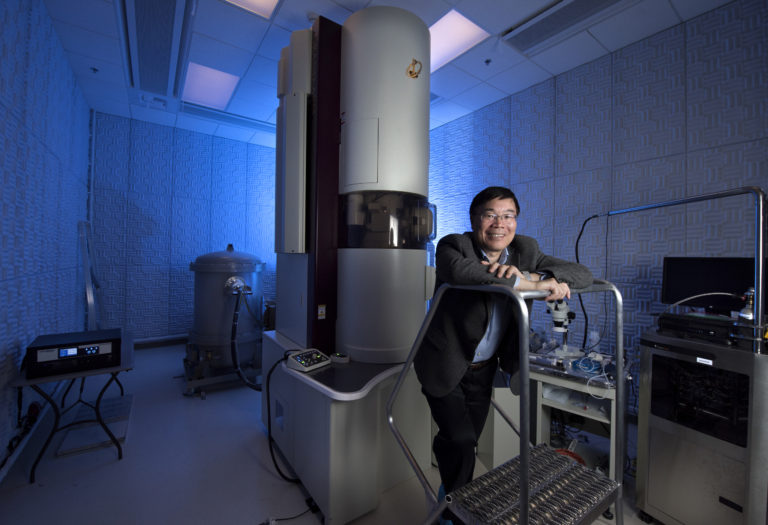NSF Grants $18 Million to UCI for Materials Science and Engineering Center
Researchers will develop new substances for manufacturing, defense and health

“This NSF grant is the result of a multiyear, $25 million effort to build state-of-the-art materials characterization facilities under the auspices of the UC Irvine Materials Research Institute,” said principal investigator Xiaoqing Pan, UCI’s Henry Samueli Endowed Chair in Engineering and a professor of materials science & engineering as well as physics & astronomy. Steve Zylius / UCI
July 14, 2020 - The National Science Foundation has awarded $18 million to the University of California, Irvine in support of a new materials research science and engineering center. UCI is one of three MRSECs newly funded by the NSF in 2020, joining 16 other existing centers at leading research institutions in the United States.
The UCI MRSEC, which officially begins its six-year operation period on Sept. 1, will engage researchers in the discovery and development of materials with new capabilities – addressing grand challenges in advanced manufacturing, human health and national defense. Using sophisticated tools, such as those found in UCI’s recently established transmission electron microscopy facility, scientists and engineers will probe and electronically control substances at the atomic level.
The new center will also offer a broad range of education and outreach activities in the spirit of diversity and inclusion for all levels of the faculty, students and staff, with the goal of establishing UCI as a major research hub for Southern California’s academic and industry materials ecosystem.
“This NSF grant is the result of a multiyear, $25 million effort to build state-of-the-art materials characterization facilities under the auspices of the UC Irvine Materials Research Institute,” said MRSEC principal investigator Xiaoqing Pan, UCI’s Henry Samueli Endowed Chair in Engineering and a professor of materials science & engineering as well as physics & astronomy. “Our efforts have greatly enhanced UCI’s prominence in the materials research community and have made us ready to land the MRSEC.”
He noted that another element in UCI’s success in earning the award has to do with people.
“In addition to the labs and equipment, UCI has focused on recruiting and hiring more than 20 leading scientists and engineers in areas of materials research and engineering from diverse backgrounds, giving us the personnel and facilities we need to excel,” Pan said.
Investigations in UCI’s MRSEC will fall under two broad categories. One interdisciplinary research group will probe the atomic-level structure, chemistry, thermodynamics, kinetics, and electrical and mechanical properties of interfaces in complex concentrated substances. This new class of materials exhibits such exceptional qualities as high strength, ultra-low thermal conductivity and the ability to withstand extreme environments – with applications in aerospace, automotive engineering, national defense and space exploration.
Another group will study fundamental charge-matter interactions in supramolecular “living” materials. This team will design and synthesize conductive, active components with electrical stimuli-powered self-assembly capabilities, exploring how these mechanisms and dynamics function in real time. The goal of this research is to develop novel electronic building blocks for biointerfaces and biological computing.
“Our work in this new center to develop complex-concentrated, hard materials as well as bioinspired soft substances will be truly interdisciplinary, encompassing activities in almost every school at UCI,” said Reginald Penner, a UCI professor of chemistry who, along with Pan and Matt Law, associate professor of chemistry, was instrumental in the formation of IMRI.
“The establishment of this new, NSF-funded materials science and engineering center positions UCI in the top tier of research institutions in the world,” said Pramod Khargonekar, the campus’s vice chancellor for research. “This landmark achievement is a testament to the groundwork laid by Professor Pan and the entire team at UCI, and it’s a terrific beginning to what I expect to be a long and fruitful period of scientific discovery and technological innovation.”
Co-investigators on the grant include UCI faculty Zhibin Guan, physics and astronomy; Ruqian Wu, chemistry; and Regina Ragan and Timothy Rupert, materials science and engineering.
– Brian Bell / UCI
